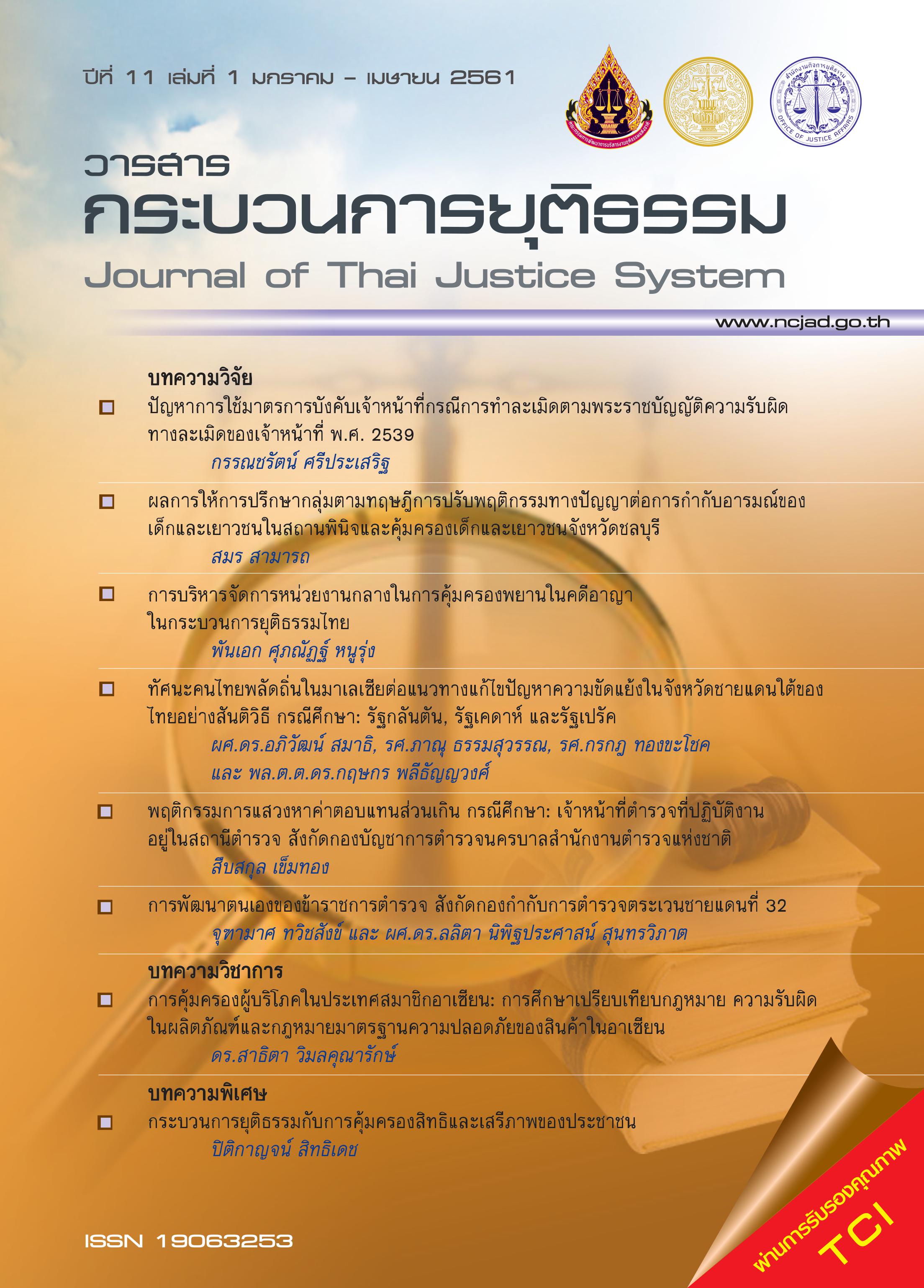ทัศนะคนไทยพลัดถิ่นในมาเลเซียต่อแนวทางแก้ไขปัญหาความขัดแย้ง ในจังหวัดชายแดนใต้ของไทยอย่างสันติวิธี กรณีศึกษา: รัฐกลันตัน, รัฐเคดาห์ และรัฐเปรัค
Main Article Content
บทคัดย่อ
งานวิจัยนี้มีวัตถุประสงค์เพื่อศึกษา 1) เพื่อศึกษาทัศนะคนไทยพลัดถิ่นในประเทศมาเลเซียต่อความเข้าใจในสถานการณ์ที่เกิดขึ้นในจังหวัดชายแดนใต้ของไทย 2) เพื่อศึกษาทัศนะคนไทยพลัดถิ่นในประเทศมาเลเซียต่อแนวทางแก้ไขปัญหาความขัดแย้งในจังหวัดชายแดนใต้ของไทยอย่างสันติวิธีตามกรอบนโยบายของสำนักงานเลขาธิการสภาผู้แทนราษฎร และ 3) เพื่อศึกษาแนวทางการแก้ไขปัญหาและข้อเสนอแนะที่มีความเหมาะสมต่อการบังคับใช้ในพื้นที่จังหวัดชายแดนใต้ของไทยอย่างสันติวิธี วิธีการดำเนินการวิจัยประกอบด้วย ขั้นตอนแรก ศึกษาเอกสารและงานวิจัยที่เกี่ยวข้อง ขั้นตอนที่ 2 ดำเนินการเก็บข้อมูลจากกลุ่มตัวอย่าง 3 วิธี คือ (1) เก็บแบบสอบถามในพื้นวิจัย คือ รัฐกลันตัน เก็บจากเขตตุมปัต และเขตโกตาบาลู รัฐเคดาห์เก็บจากเขตกุบังปาซู และเขตปาดังเตรัป และรัฐเปรัคเก็บจากเขตฮูลูเปรัค และเขตคูลาคังซา โดยเก็บข้อมูลตามแนวทางการกระจายน้ำหนักทางสถิติรวมทั้งสิ้น 1,200 ราย รัฐละ 400 ราย (2) ทำการสัมภาษณ์ผู้นำชุมชน ผู้นำทางศาสนา ประชาชนในพื้นที่วิจัย และข้าราชการไทยในประเทศมาเลเซีย 17 ราย (3) จัดเวทีเสวนาระดมความคิดเห็นของประชาชน 3 เวทีใน 3 รัฐ มีผู้เข้าร่วมการเสวนาประมาณ 40 ราย ต่อครั้ง ขั้นตอนที่ 3 นำผลข้อมูลที่ได้จากการเก็บแบบสอบถาม, การสัมภาษณ์ และจัดเวทีเสวนามาวิเคราะห์เพื่อหาค่าเฉลี่ย, สัดส่วนร้อยละ และทดสอบสมมติฐาน และขั้นตอนที่ 4 นำผลการวิจัยมาวิเคราะห์ร่วมกับเอกสารงานวิจัยที่ได้ศึกษามาเพื่อเขียนรายงานการวิจัย และสร้างโมเดลอธิบายผลการดำเนินการวิจัย
ผลจากการดำเนินการวิจัยพบว่า วัตถุประสงค์ที่ 1 ทัศนะของคนสยามต่อระดับความหวาดกลัวต่อสถานการณ์ที่เกิดขึ้นในจังหวัดชายแดนใต้ของไทย ระดับมาก (3.83) รองลงมาคือ ข่าวสารที่ได้รับต่อสถานการณ์ความไม่สงบในจังหวัดชายแดนภาคใต้จากสื่อต่างๆ เชื่อว่ามีความรุนแรงระดับมาก (3.67) เช่นกัน ด้านทัศนะต่อความเข้าใจในสถานการณ์ที่เกิดขึ้นในจังหวัดชายแดนใต้ ระดับปานกลาง (3.25) วัตถุประสงค์ที่ 2 ทัศนะต่อปัจจัยที่ก่อให้เกิดสถานการณ์ความไม่สงบในจังหวัดชายแดนภาคใต้ของไทย พบว่าด้านการศึกษาถือเป็นปัจจัยสำคัญต่อการเกิดปัญหาอธิบาย คือ ค่านิยมของชาวไทยมุสลิมนิยมให้บุตรหลานเรียนโรงเรียนตาดีกาหรือปอเนาะมากกว่าโรงเรียนของรัฐบาล ระดับมาก (3.85) ทำให้ง่ายต่อการชักนำให้เข้าสู่กลุ่มแนวร่วม รองลงมาคือ ปัญหาทางการเมือง ระดับมาก (3.68) โดยมองว่าปัญหาเรื่องการแบ่งแยกดินแดนเป็นประเด็นสำคัญ และมีการกำหนดนโยบายของรัฐบาลผิดพลาดมาโดยตลอด ตลอดจนการบิดเบือนคำสอนทางศาสนาเพื่อสร้างความชอบธรรมในการก่อความไม่สงบ วัตถุประสงค์ที่ 3 ทัศนะต่อแนวทางแก้ไขปัญหาความขัดแย้งในจังหวัดชายแดนภาคใต้ของไทยอย่างสันติวิธี พบว่า แนวทางการแก้ไขปัญหาประกอบด้วยแนวทางดังนี้คือ ควรมีการสนับสนุนให้เด็กและเยาวชนในพื้นที่ได้รับการศึกษาจากรัฐบาลให้มากยิ่งขึ้นเพื่อจบออกมาแล้วจะได้มีงานทำ ประเด็นต่อมาคือ ควรมีการคัดสรรเจ้าหน้าที่ของรัฐที่ดีและมีคุณภาพเข้ามาทำงานในพื้นที่ ควรทำให้ทุกศาสนาอยู่ร่วมกันบนพื้นฐานของการเคารพในวัฒนธรรมซึ่งกันและกันและสร้างความเป็นธรรมให้กับทุกฝ่าย และต้องสร้างฉันทามติของชาติต่อการอยู่ร่วมกันบนพื้นฐานของความสันติสุข ข้อเสนอแนะจากการวิจัย 1. ปัญหาหลักคือ เรื่องของการแบ่งแยกดินแดน รองลงมาคือการที่รัฐบาลไม่มีการควบคุมโรงเรียนปอเนาะให้อยู่ในกำกับดูแลตั้งแต่ต้นจึงง่ายต่อการปลูกฝังค่านิยมผิดๆ ให้กับเยาวชนประกอบกับการบิดเบือนคำสอนทางศาสนา 2. การแก้ไขปัญหาในจังหวัดชายแดนใต้ยังไม่มีประสิทธิภาพเท่าที่ควรเนื่องจากไม่สามารถนำกฎหมายมาบังคับใช้ได้อย่างมีประสิทธิภาพ 3. ประเทศมาเลเซียตามแนวตะเข็บชายแดนมีการใช้มาตรการ TC หรือ Three Control คือการให้เจ้าหน้าที่ของรัฐด้านความมั่นคง 1 นาย รับผิดชอบสอดส่องดูแล 3 ครอบครัว เพื่อการคุ้มครองดูแลชาวบ้านและทำให้ทราบถึงความเคลื่อนไหวของกลุ่มแนวร่วมที่แผงตัวอยู่ในหมู่บ้าน 4. การเจรจาถือเป็นทางออกที่ดีที่สุดของการยุติปัญหา แต่ตัวแทนเจรจาต้องได้รับการยอมรับจากทั้งสองฝ่าย ตลอดจนการสร้างความสามัคคีของคนในชาติและความเข้าใจในอัตลักษณ์ของแต่ละศาสนาในการอยู่ร่วมกัน
Article Details
ต้นฉบับที่ได้รับการตีพิมพ์ในวารสาร เป็นลิขสิทธิ์ของวารสารกระบวนการยุติธรรม แต่ความคิดเห็นที่ปรากฏในเนื้อหาของบทความในวารสารกระบวนการยุติธรรม ถือเป็นความรับผิดชอบของผู้เขียนแต่เพียงผู้เดียว
เอกสารอ้างอิง
คณะกรรมการพัฒนาการบริหารงานยุติธรรมแห่งชาติ. (2551). รายงานประจำปี 2551-2552 เรื่อง “แผนยุทธศาสตร์การพัฒนากระบวนการยุติธรรมในจังหวัดชายแดนใต้ พ.ศ. 2553-2557. กรุงเทพมหานคร. สำนักพิมพ์กระทรวงยุติธรรม.
ธำรงค์ศักดิ์ อายุวัฒนะ. (2547). ไทยในมาเลเซีย. กรุงเทพฯ. สำนักพิมพ์ บรรณกิจ 1991 จำกัด.
ปัญญา จินเดาเพชร. (2556). Pesila :Pesatuan Siam Kelantan Kuala Lumpur dan Selangor. Malaysia.
พรทิพย์ โรจนสุนันท์. (2552). นิตยาสารหัวใจเดียวกัน. ฉบับที่ 2 ประจะเดือนมิถุนายน 2552. กรุงเทพมหานคร. หจก.ควอลิตี้ ออฟอาร์ต.
วิภาดา คุปตานนท์. (2551). การจัดการและพฤติกรรมองค์การ: เทคนิคการจัดการสมัยใหม่. กรุงเทพมหานคร
อภิวัฒน์ สมาธิ. (2554). การดำเนินนโยบายของรัฐภายใต้การบังคับใช้กฎอัยการศึกในสามจังหวัด ชายแดนภาคใต้. ดุษฏีนิพนธ์มหาวิทยาลัยอีสเทิร์นเอเชีย. กรุงเทพมหานคร
อภิวัฒน์ สมาธิ และคณะ. (2556). การบริหารงานยุติธรรมภายใต้การบังคับใช้กฎอัยการศึกและพระราชกำหนดการบริหารราชการในสถานการณ์ฉุกเฉินเพื่อแก้ไขปัญหาความขัดแย้งในจังหวัดชายแดนภาคใต้. สงขลา. งานวิจัยสำนักงานตำรวจแห่งชาติกองบังคับการตำรวจภูธรจังหวัดสงขลา. มหาวิทยาลัยทักษิณ สงขลา.
อภิวัฒน์ สมาธิ และคณะ. (2558). การบริหารงานยุติธรรมบนพื้นฐานกระบวนการยุติธรรมเชิงสมานฉันท์ต่อ แนวทางการสร้างความสันติสุขในสามจังหวัดชายแดนภาคใต้กรณีศึกษา : จังหวัดยะลา, ปัตตานี และนราธิวาส. สงขลา. ทุนวิจัยงบประมาณเงินแผ่นดิน ประจำปี 2558 สถาบันวิจัยแห่งชาติและมหาวิทยาลัยทักษิณ สงขลา.
Department of Statistics. (2015)."Population and Housing Census of Malaysia 2010". Malaysia.


